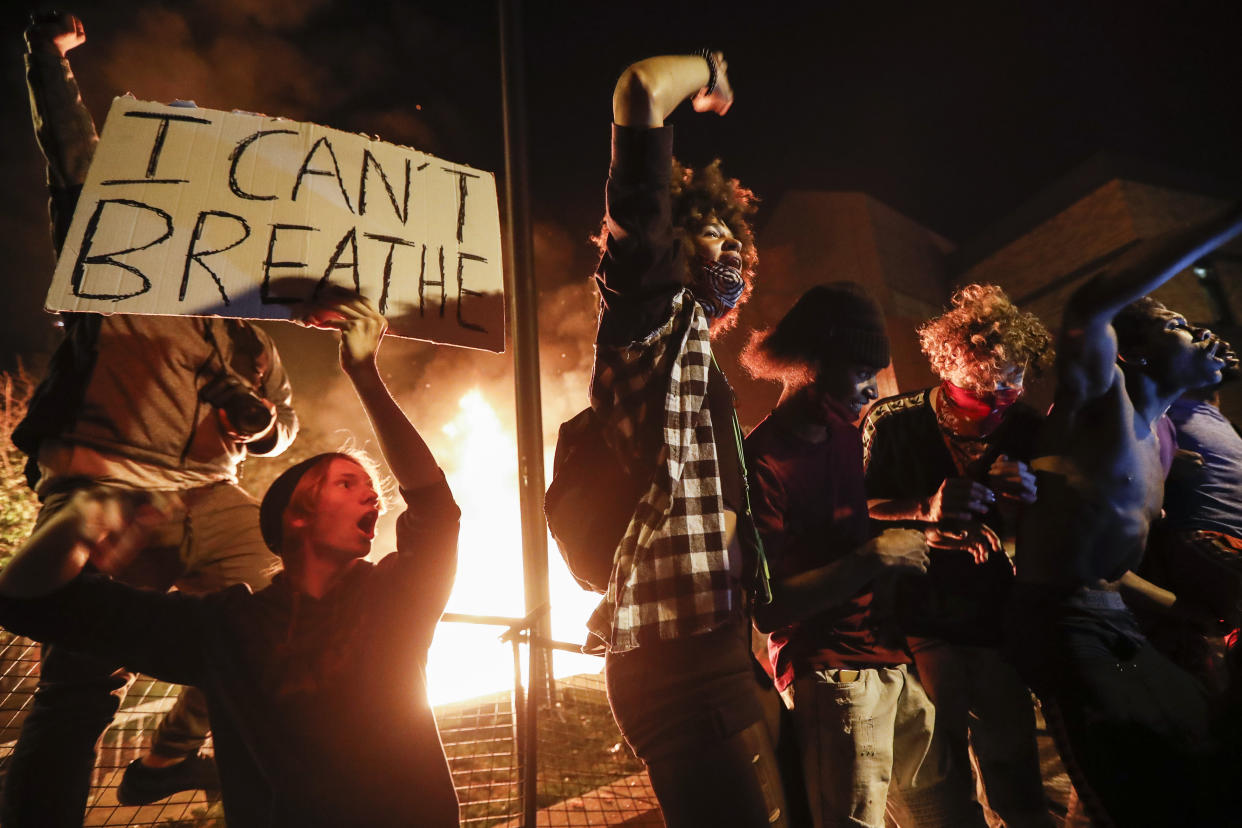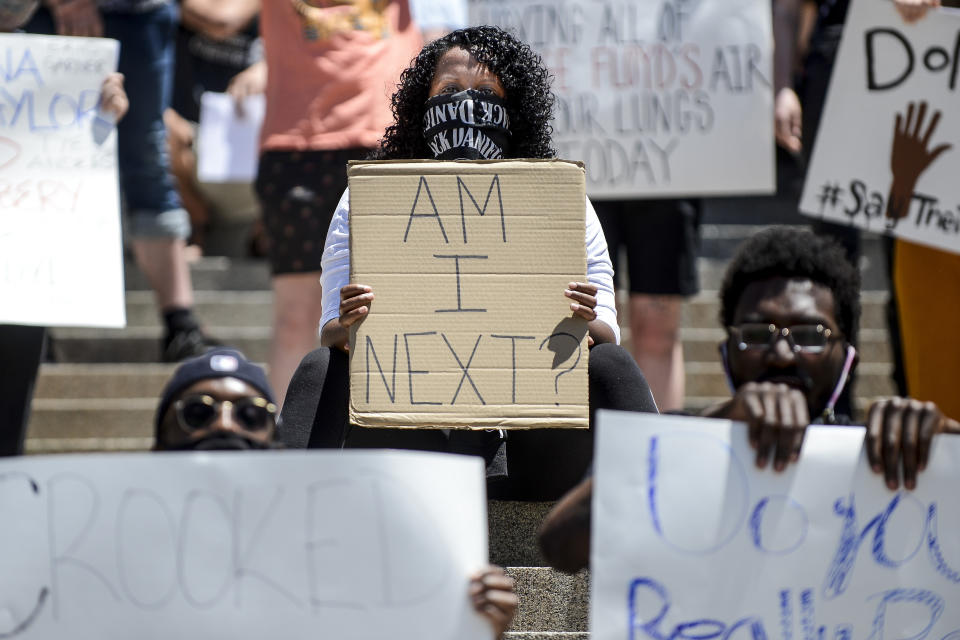Prompted by calls to 'give grace' to cop who killed George Floyd, black activists question the rush to forgive

This week the world watched in horror as yet another unarmed black man, George Floyd, was killed, on video, by a police officer — and then, just a couple of days later, heard his ex’s public appeal for forgiveness. Her surprising plea has split much of the black community. It also speaks to a larger pattern by victims of racist violence, say experts, that some have called “toxic.”
On Monday, Floyd, a 46-year-old black unarmed Minnesota resident, died pleading for his life and gasping for air as a police officer knelt on his neck to pin him to the ground. The officers involved in the incident have since been fired, with one — Derek Chauvin, the officer who did the kneeling — arrested and charged with murder on Friday, after days of public outcry.
But while the killing has led to collective trauma, outrage and fiery protests in Minneapolis and other cities, including Denver, New York and St. Louis, Floyd’s ex-fiancée, Courteney Ross (who happens to be white), has requested that people forgive the officers.
“You can’t fight fire with fire,” she told CBS Minnesota. “Everything just burns, and I’ve seen it all day. People hate, they’re hating, they’re hating, they’re mad. And he would not want that. He wouldn’t, he wouldn’t, he wouldn’t. He would give grace — I stand on that today — he would still give grace to those people.”
Then came Denver Nuggets player Michael Porter Jr.’s tweeted follow-up, noting that prayers should go out to both Floyd’s family and the officers who were fired.
As much as you pray for George family, gotta also pray for the police officer(s) who were involved in this evil. As hard as it is, pray for them instead of hate them...Pray that God changes their hearts.
— Michael Porter Jr (@MPJr) May 27, 2020
Both appeals were met with backlash, with many critics seeing their calls for peace and prayers as potentially derailing the collective fight against police brutality.
So, Courtney Ross Floyd's white fiancee is doing the modern-day Rodney King speech, "Can we all just get along'. She is speaking to that forgive narrative as well. #JusticeforGeorgeFloyd#EnoughIsEnough pic.twitter.com/4ggNJqRiku
— JustNannie (@nanniebrownsuga) May 27, 2020
That’s really the first thing you have to say—after watching a 9-minute video of a demon who has multiple excessive force complaints and 3 prior police-involved shootings on his record—with his knee on #GeorgeFloyd’s neck as life oozed out of his body?
Miss me with ALL of this.— Neale (@AbeFroman) May 27, 2020
pray for the who?? pic.twitter.com/chhPK83vEU
— uncle charlize theron (@stardeshaun) May 27, 2020
You're a good guy, Michael. This is very admirable.
But no.— Dee Phunk (@DeePhunk) May 27, 2020
Some are even worried that Ross’s mercy plea could negatively impact the case. “The family better not let this woman anywhere near the court proceedings,” cautioned a critic on Facebook. “And the reason I’m giving this any light, is because they’re going to use this to create an exit for these murderers.”
The calls for forgiveness seem to bow to — and perpetuate — the perceived pressure to forgive murders that feel, to the vast majority, unforgivable.
The appeals are certainly not the first of their kind — and actually seem to fit into a long-running narrative that some observers have referred to as “toxic black forgiveness.” Although, for some, the rush to forgive can be understood in a more tempered way.
“In this current moment right now … where we’re seeing, unfortunately, the predicted patterns of black trauma — especially at the hands of another incident of police brutality — I hesitate to attach the word ‘toxic’ to black forgiveness,” says Judy Lubin, sociologist, policy analyst, Howard University adjunct sociology professor and principal of the Center for Urban and Racial Equity. Although she does understand where it comes from, she tells Yahoo Life.

“It’s not my place to tell anyone how to grieve, but some of these public displays are upsetting, because justice oftentimes isn’t fully provided,” she notes, but adds that, still, she thinks that such forgiveness “is a coping strategy in response to racism."
Lubin continues, “Recognizing the level of trauma that we as black people have experienced and continue to experience, we’ve developed different types of coping strategies. And one is to lean on forgiveness, and finding a way to move on in a way that doesn’t drive you insane.”
Other recent examples of those who have been quick to forgive: When Brandt Jean, younger brother of Botham Jean — gunned down by a police officer in his own apartment in 2018 — took the stand during officer Amber Guyger’s sentencing to offer forgiveness, invoking God and saying, “I love you just like anyone else, and I’m not going to hope you rot and die. I personally want the best for you.” He then did what most would consider unfathomable and requested to give Guyger a hug, which he did, in a gesture that lasted two minutes and shocked the nation, leaving many divided over his motive.
Hugging your oppressor hasn't gotten us ANYWHERE. But, during Shirley Chisholm's campaign she was warned: "Please don't do this" by Black Folk.
But she was stubborn and she did it anyway. When George Wallace, a super racist, got sick she rushed to his bedside. pic.twitter.com/BkV2CKyl9r— MassUpdater (@MassUpdater) March 6, 2020
There is a history to this, but if it's white washed or Black washed out, then we'll continuously repeat the same mistake over & over. Whether U're talking about Issa Rae, Symone Sanders, or the Baptist Church Forgiveness Negroes, there is a RUSH by some Black Folk to save massa pic.twitter.com/5E4x5VmOer
— MassUpdater (@MassUpdater) March 6, 2020
Similarly, some families of victims of the 2015 Charleston Church Massacre offered shooter Dylann Roof forgiveness after he murdered nine members of the clergy. “I forgive you. ... You took something really precious from me,” said a tearful Nadine Collier, surviving daughter of Ethel Lance, at Roof’s bond hearing. “I will never talk to her ever again, I will never be able to hold her again, but I forgive you and have mercy on your soul.” Similarly, former minor league baseball star Chris Singleton, who lost his mother in the massacre, told USA Today, “I never thought I would be able to forgive somebody for murdering my mom,” and then noting that he did.
And then there was, of course, the infamous Rodney King speech, in 1992, by the black man whose beating by members of the Los Angeles Police Department had sparked L.A. riots. He’d said, “People, I just want to say, you know, can we all get along? Can we get along?” In 2012, just months before he died, King spoke out about learning to forgive.
“Black Christians give away forgiveness like it’s confetti,” noted Rev. Irene Monroe, an ordained minister and LGBT activist, in a Cambridge op-ed that analyzed and questioned the phenomenon after the forgiveness shown both in Charleston and by Jean. “In the face of continued racial violence done to us,” she wrote, “I now must question if our church teachings of forgiveness of the last centuries are serving us well in this new century, particularly with the resurgence of white nationalism.”
She continued, “Forgiveness is one of the essential tenets that runs deep in the theology, prayers, and songs of Black Christianity,” and concluded that the expectation of such forgiveness “is quickly drawn along marginal lines within religion, race, class, gender, and sexuality, to name a few. Within these marginal groups, too often, the theologies and praxis of forgiveness avoid fully reckoning individual or group pain, suffering, and the lingering effects of trauma, grief, and even rage.”
Ashton Woods, co-founder and lead organizer of Black Lives Matter Houston, does find such forgiveness “toxic,” he tells Yahoo Lifestyle. “Toxic black forgiveness, like hugging the cop who killed your brother, is rooted in respectability politics and a desire to buy into the ‘white gaze’ and pretend that you are exempt from your blackness,” he says. “The truth is that we must stop viewing ourselves through the white gaze, which was beaten into us through slavery and institutional oppression.”
Lubin believes that the desire to forgive or not forgive in these cases is deeply complex. “Sometimes, I think, in the rush to forgive, does that mean that we [also] don’t pursue the systemic and institutionalized changes that need to happen? When I hear ‘toxic black forgiveness,’ I think there’s a sense from some folks that [these displays] are also a forgiveness of a system that continues to brutalize us,” she says. “We don’t need to forgive that system. When you use the phrase, ‘I forgive you,’ it then individualizes what we know is a systemic issue, particularly with the behavior of law enforcement.”
One survivor of police brutality who has not been able to forgive is Gwen Carr, the mother of Eric Garner, who after five years of rallying for justice expressed her unrest last year when the U.S. Department of Justice declined to prosecute the officer who choked Garner. “How do you forgive?” Carr asked, clearly wrestling with the concept. “As a Christian you’re supposed to forgive.”
That sort of wrestling, perhaps, comes from the desire to heal, says Lubin. “There can be peace and healing in forgiveness, but we can’t ask black people to forgive, you know? I think that’s the thing,” she stresses. “In these moments, people have to be able to go on their own journey of healing and peace, and we don’t know what that looks like for individuals and their families.”
